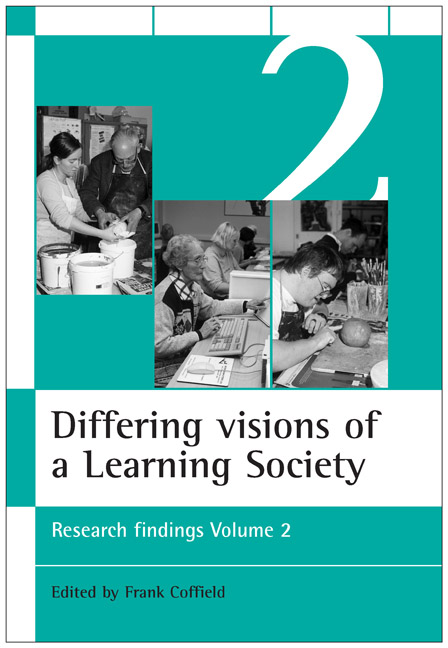Book contents
- Frontmatter
- Contents
- Notes on contributors
- Dedication
- The three stages of lifelong learning: romance, evidence and implementation
- one The meaning of the Learning Society for adults with learning difficulties: bold rhetoric and limited opportunities
- two Networks, norms and trust: explaining patterns of lifelong learning in Scotland and Northern Ireland
- three Learning culture, learning age, learning society: turning aspirations into reality?
- four Teaching and learning in higher education: issues of innovation
- five Participating in the Learning Society: history, place and biography
- six Skills in the British workplace
- Index
- The Learning Society series
five - Participating in the Learning Society: history, place and biography
Published online by Cambridge University Press: 05 July 2022
- Frontmatter
- Contents
- Notes on contributors
- Dedication
- The three stages of lifelong learning: romance, evidence and implementation
- one The meaning of the Learning Society for adults with learning difficulties: bold rhetoric and limited opportunities
- two Networks, norms and trust: explaining patterns of lifelong learning in Scotland and Northern Ireland
- three Learning culture, learning age, learning society: turning aspirations into reality?
- four Teaching and learning in higher education: issues of innovation
- five Participating in the Learning Society: history, place and biography
- six Skills in the British workplace
- Index
- The Learning Society series
Summary
Economic change and the Learning Society
There has been a remarkable renewal of governmental concern with education and its organisation over the past couple of decades in Britain (and, indeed, elsewhere). Through much of the 1980s, it was schools and schooling which provided the focal point of policy makers’ attention (for example, Ball, 1990). More latterly, the focus has widened to encompass a broader conceptualisation of ‘lifelong learning’, which certainly continues to embrace the compulsory phases of education, but also includes activities in further and higher education, as well as continuing education and training throughout adult life (for example, Coffield, 1999). This is not to suggest, of course, that this shift in policy emphasis has produced a coherent strategy with respect to education and training through the life course (a point to which we return later). Nevertheless, the change is unmistakable. For example, the creation of a Minister for Lifelong Learning within the Department for Education and Employment (DfEE), along with equivalent positions in the devolved Scottish and Welsh administrations, signals a formal acknowledgement of its significance. Similarly, a plethora of official reports and other policy statements on lifelong learning have flowed from government departments in recent years. Especially since the election of the New Labour administration in 1997, official pronouncements about lifelong learning have proliferated spectacularly. There have been three substantial reports (Kennedy, 1997; Fryer, 1997; NCIHE, 1997), a major Green Paper (DfEE, 1998) and most recently a White Paper on the reorganisation of post-16 education and training (DfEE, 1999). Certainly, lifelong learning has come to occupy a position which – symbolically at least – is at the centre of government strategy (Ainley, 1998; Tight, 1998).
What is involved here is more than a narrowly technical adjustment to the organisation of educational provision. It is instructive, for example, that the key Green Paper was given the portentous title, The Learning Age: A renaissance for a new Britain (DfEE, 1998). What is suggested, then, is a transformation in learning opportunities, which is crucial to effecting a profound restructuring of wider social and economic relations. The intellectual basis for this is provided, in turn, by what has become a widespread consensus about the emergent requirements of the economy.
- Type
- Chapter
- Information
- Differing visions of a Learning Society Vol 2Research Findings, pp. 171 - 192Publisher: Bristol University PressPrint publication year: 2000



